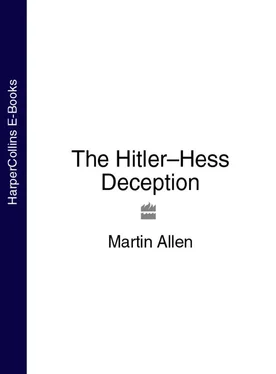Hess’s pleas, however, fell on deaf ears. In London no one was listening any more. The time of appeasement had passed, and diplomatic deals were busily being done to bolster an Anglo–French partnership to support Poland.
CHAPTER 2
Peaceable Attempts
At dawn on 1 September 1939, Hitler’s powerful new armies poured across the Polish frontier in a pre-emptive strike that would see Poland obliterated in under a month, and the Second World War begin. It would, however, be wrong to assume that the German Führer actually wanted an all-encompassing European war that was destined to become a world war, or that he realised that this would be the consequence of his actions. Over the next year, Hitler, increasingly aware of the Pandora’s Box of horrors he had unleashed – that Germany was now pitted in a life-or-death struggle against Britain and her empire – would repeatedly try to open a secret line of communication to the British government in the hope of undoing the disastrous situation he had himself created.
These secret peace moves, of which only a very select handful of top men in Britain and Germany were aware (and which were kept secret from their people for very different reasons), became known by Britain’s Foreign Office and War Cabinet as the ‘peaceable attempts’; petitions made by Hitler and certain other leading Nazis to open negotiations that would culminate in an armistice. As time went by these peaceable attempts would take on an ever-increasing urgency, reflecting Hitler’s mounting concern (despite his belligerent public stance for home consumption) that he was losing control of events.
In the first week of September 1940, whilst the skies above London thundered to the sound of the Battle of Britain, Britain’s Ambassador to Sweden, Victor Mallet, would send a ‘most secret’ encrypted telegram for ‘special distribution’ to the War Cabinet. In his telegram, an astounded Mallet reported that he had been contacted by a Berlin barrister named Dr Ludwig Weissauer, who ‘is understood to be a direct secret emissary of Hitler … [Furthermore, he wishes] me to meet him very secretly in order to … talk on the subject of peace.’
Dr Ludwig Weissauer was in fact not only chief lawyer to the Nazi Party, but also Adolf Hitler’s own private legal adviser. The Ambassador went on to reveal that this most eminent emissary ‘wished conversations, if they took place, to be known to nobody but His Majesty’s Government and Hitler to whom he intimated that he would report direct. Talks could begin at once … [if a Swedish, and therefore neutral,] judge might be present in order to avoid any suggestion of trickery. Weissauer realised that peace might not yet be attainable but nevertheless felt that conversation would be useful.’ 1Mallet concluded his report by asking whether he should go ahead and meet Weissauer, before ending hopefully, ‘of course [I will] say nothing to encourage him but it might be of interest to listen’.
This was an unusual and, until recently, unsuspected situation. That Hitler should make this secret approach to Britain – and it is worth noting that the initiative was kept secret from other top Nazis, as well as the German people – is indicative that something extraordinary was taking place behind the scenes. Hitler’s use of his own lawyer was the culmination of a year’s peace moves by the German Führer that had seen him attempt mediation through many avenues, ranging from neutral citizens and governments, to royalty and the Vatican. All had failed, undone, in Hitler’s eyes, by a political faction in Britain that was determined to continue the war, come what may. This had not prevented him, during the final months of 1939 and the first half of 1940, from pursuing an aggressive military strategy tied to his private attempts to make peace – a carrot and stick policy that he hoped would free him from a war in the west he did not want.
Despite all the evidence that Hitler wanted to flex his military muscles, and was willing to obtain by force what he was unlikely to gain at the diplomatic table, a full-blown war with Britain and France, supported by their substantial empires, was certainly not something he wanted in 1939. His primary objective had been to make the first moves in a politico-military game of chess that would see him expand and consolidate a Greater Germany, thereby placing Germany in the ideal position to expand her territories into an Eastern Empire. A substantial proportion of the responsibility for Hitler’s total miscalculation of the British and French reaction to the formation of a German super-state at the expense of her smaller neighbours, such as Czechoslovakia and Poland, has to be laid firmly at the door of his Foreign Minister, Joachim von Ribbentrop.
In the months prior to the outbreak of war, Ribbentrop forcefully counselled Hitler that Britain would not come to the aid of Poland but would, bar the diplomatic protests and the fist-waving of a frustrated nation led by a weak government, flinch and stand back from outright war. 2This view was in direct contrast to what Germany’s other foreign affairs experts, such as Albrecht Haushofer, were advising Hitler. In the late spring of 1939, Hess had commissioned Haushofer to write a report for him on the British reaction to German expansion. Within weeks the Deputy-Führer was alarmed to read Haushofer’s prophetic comments that:
many British politicians … [are] thoroughly friendly towards Germany … [and] would consider discussing border changes to Germany’s advantage … But a violent solution … would be a casus belli for England … In such a war the entire nation would support the government. England would wage the war as a crusade for the liberation of Europe from German nationalism. With the help of the USA (on which London could count) they would win the war against Germany [and] regrettably the actual winner in Europe would be Bolshevism. 3
On its way to Hitler, the report was first shown to Ribbentrop, who disdainfully scrawled in the margin: ‘English secret-service propaganda!’ 4But he was wrong.
On 3 September 1939, an utterly dejected Neville Chamberlain, worn out and disillusioned by his failure to deal with the dictator of Germany, stood before his colleagues in the House of Commons. He had seen his hopes for European peace blown away by the dry, hot wind of war. History is harsh, and Chamberlain’s twenty-five years of honest public service would be forgotten in an instant. His name would forever be linked to the appeasement of Nazism, the pandering to a dictator who was plunging Europe into war even as he addressed the House.
A hush descended amongst the MPs, and Chamberlain began to speak, his sonorous tones echoing around the chamber as he declared:
When I spoke last night to the House I could not but be aware that in some parts of the House there were doubts and some bewilderment as to whether there had been any weakening, hesitation, or vacillation on the part of His Majesty’s Government. In the circumstances, I make no reproach, for if I had been in the same position as hon[ourable] members not sitting on this Bench and not in possession of all the information which we have, I should very likely have felt the same.
After informing the House that the British Ambassador in Berlin had delivered an ultimatum to the German government demanding that German armed forces ‘suspended all aggressive action against Poland and were prepared to withdraw their forces from Polish territory’, Chamberlain went on to disclose that: ‘No such undertaking was received from [the German government] by the time stipulated, and, consequently, this country is at war with Germany.’
Finally, Chamberlain opened up slightly, expressing his own feelings of personal failure: ‘This is a very sad day for all of us, and to none is it sadder than to me. Everything that I have worked for, everything that I have hoped for, everything that I have believed in during my public life, has crashed into ruins. There is only one thing left for me to do; that is, to devote what strength and powers I have to forwarding the victory of the cause for which we have to sacrifice so much. I cannot tell what part I may be allowed to play myself; I trust I may live to see the day when Hitlerism has been destroyed and a liberated Europe has been re-established …’ 5
Читать дальше












